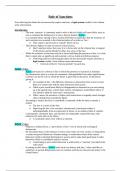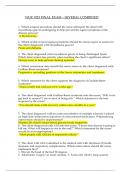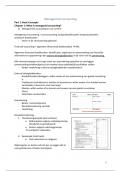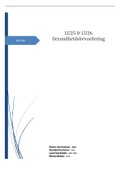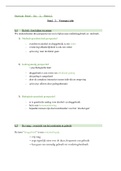Role of Sanctions
Even allowing that duties do not necessarily require sanctions, a legal system couldn’t exist without
some enforcement.
Introduction:
- The term ‘sanction’ is commonly used to refer to the evil which will most likely incur in
case a command be disobeyed or in case a duty be broken (Austin).
- Is a common theory among writers, Austin and Kelsen in particular, that the existence of
such sanctions are essential to the characterisation of an order as ‘law’.
o They claim to put forward a “simple” theory of law.
- Their theory neglects to take account of critical factors.
o Hart’s analysis shows how easy it is to focus only on the criminal law in support
of this theory and be blinded to other, key areas, of the law.
- While the existence of sanctions may be a factor indicating the presence of law, it is clear
that it cannot play as significant and essential a role as Austin and Kelsen propose.
o That being said even allowing that duties do not necessarily require sanctions, a
legal system couldn’t exist without some enforcement.
Criticism of Hart’s “internal attitude” towards law.
Austin’s View:
- Austin advocates for a theory of law in which the presence of sanctions is essential.
- He characterises laws as a series of commands, distinguishable from other significations
of desire, not by the way in which the desire is given but by the power of the person
giving it.
o An example of this = the difference between an instruction from a tutor to meet
them at a certain time and the same instruction from a peer.
o While a peer would most likely be disappointed or distressed at you not turning
up at the agreed time, a much more serious consequence would likely follow if
you failed to abide by your tutor’s instructions.
o What’s more, the incentive to follow such instructions is arguably much stronger
when coming from an authority figure.
- According to Austin, the first is considered a command, while the latter is merely a
request.
o The law is a series of the first.
o Depriving the law of its executive characteristic (sanctions) renders it
indistinguishable from an expression of desire, or an ordinary habit of conduct.
- Consequently, command, duty, and sanction are inseparably connected terms; each
embraces the same idea as the others.
o A command cannot exist without a sanction.
Kelsen’s View:
- Proposes a similar theory, a “pure theory of law”, free of moral and sociological
distinctions.
- He articulates that it is the function of every social order, of every society, to bring about
a certain reciprocal behaviour of human beings, to make them refrain from certain
behaviour which is deemed detrimental to society and to make them participate in other
behaviour which is considered useful to society.
o Conforming to such useful behaviour is achieved by a “sanction” provided in the
order itself.
- In setting out this theory, Kelsen looks back over history and asks, “what could the so-
called law of ancient Babylonians have in common with the law that prevails today in the
United States.”
Even allowing that duties do not necessarily require sanctions, a legal system couldn’t exist without
some enforcement.
Introduction:
- The term ‘sanction’ is commonly used to refer to the evil which will most likely incur in
case a command be disobeyed or in case a duty be broken (Austin).
- Is a common theory among writers, Austin and Kelsen in particular, that the existence of
such sanctions are essential to the characterisation of an order as ‘law’.
o They claim to put forward a “simple” theory of law.
- Their theory neglects to take account of critical factors.
o Hart’s analysis shows how easy it is to focus only on the criminal law in support
of this theory and be blinded to other, key areas, of the law.
- While the existence of sanctions may be a factor indicating the presence of law, it is clear
that it cannot play as significant and essential a role as Austin and Kelsen propose.
o That being said even allowing that duties do not necessarily require sanctions, a
legal system couldn’t exist without some enforcement.
Criticism of Hart’s “internal attitude” towards law.
Austin’s View:
- Austin advocates for a theory of law in which the presence of sanctions is essential.
- He characterises laws as a series of commands, distinguishable from other significations
of desire, not by the way in which the desire is given but by the power of the person
giving it.
o An example of this = the difference between an instruction from a tutor to meet
them at a certain time and the same instruction from a peer.
o While a peer would most likely be disappointed or distressed at you not turning
up at the agreed time, a much more serious consequence would likely follow if
you failed to abide by your tutor’s instructions.
o What’s more, the incentive to follow such instructions is arguably much stronger
when coming from an authority figure.
- According to Austin, the first is considered a command, while the latter is merely a
request.
o The law is a series of the first.
o Depriving the law of its executive characteristic (sanctions) renders it
indistinguishable from an expression of desire, or an ordinary habit of conduct.
- Consequently, command, duty, and sanction are inseparably connected terms; each
embraces the same idea as the others.
o A command cannot exist without a sanction.
Kelsen’s View:
- Proposes a similar theory, a “pure theory of law”, free of moral and sociological
distinctions.
- He articulates that it is the function of every social order, of every society, to bring about
a certain reciprocal behaviour of human beings, to make them refrain from certain
behaviour which is deemed detrimental to society and to make them participate in other
behaviour which is considered useful to society.
o Conforming to such useful behaviour is achieved by a “sanction” provided in the
order itself.
- In setting out this theory, Kelsen looks back over history and asks, “what could the so-
called law of ancient Babylonians have in common with the law that prevails today in the
United States.”

